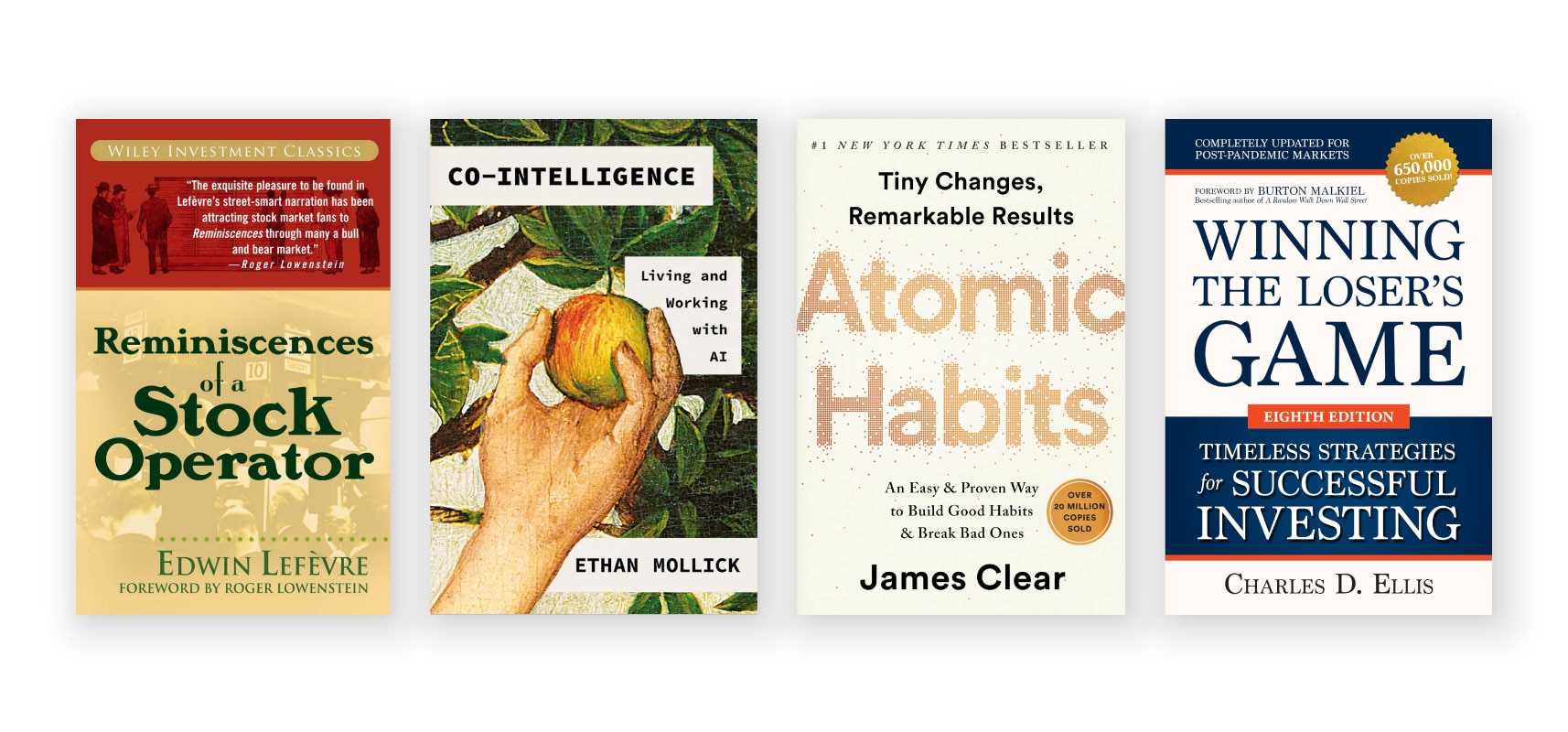Book recommendations
Winning, losing, and learning: A reading list
August 12, 2025

Reminiscences of a Stock Operator
“Everybody knows that psychology plays a big role in investing,” said Daniel Shaykevich, a senior portfolio manager in Vanguard Fixed Income Group. “But we often focus on the psychology of groups, crowds, etc. We often ignore our own psyches. Professional investors are in no way immune from psychological traps. We don’t like losing money. We love winning and beating others and often attribute our successes to skill and our failures to luck.”
To make sure that new traders appreciate both the mental aspects of investing and how security price patterns can yield more information than deep fundamental analysis, Shaykevich advises them to read a book first published more than a century ago—Reminiscences of a Stock Operator (1923) by Edwin Lefèvre.
The book is the first-person story of “Larry Livingston,” a thinly disguised version of the real-life Jesse Livermore. One of the more colorful characters in financial market history, Livermore learned to trade as a teenager by watching prices come over the “ticker tape”—the pricing feed of stock prices transmitted from stock exchanges over telegraph lines. He reportedly cornered the market in cotton before President Woodrow Wilson convinced him in 1919 to sell his positions at break-even prices, amassed $100 million by shorting stocks during the stock market crash of 1929, and married and filed for bankruptcy three times each.
The book describes markets that are rather inefficient. “Some of the behaviors driving markets during Livermore’s day are now illegal,” Shaykevich said. “But as long as humans make investment decisions, regulations limit investment options, and we have rating agencies, financial journalists, and consultants, there will be plenty of inefficiency in the markets, and sometimes your best insight may come from the tape itself.”
Co-Intelligence
ChatGPT. Machine learning. Large language models. Generative AI.
If the avalanche of headlines about artificial intelligence has you seeking clarity about all the excitement, Ryan Swann, Vanguard’s chief data analytics officer, recommends an approachable, concise book by Ethan Mollick, one of his MBA professors at the University of Pennsylvania.
Co-Intelligence: Living and Working With AI (2024) “can bring a reader from little to no understanding of AI to an understanding of artificial general intelligence,” a theoretical, human-like form of the technology in which machines can learn, reason, and adapt, said Swann.
The need for broad public understanding of AI, in addition to regulation, is pressing, according to Mollick. While the term “artificial intelligence” was coined in 1956, the technology was largely confined to niche use cases for decades. But decisive breakthroughs in recent years have enabled more mainstream applications. In particular, the potential of artificial intelligence—for purposes good and bad—has been exploding since the advent of reliable generative AI.
“For instance,” Mollick observes, “GPT-4 scored in the 90th percentile on the bar examination … and excelled in advanced placement exams, scoring a perfect 5 in calculus, physics, U.S. history, biology, and chemistry.” (GPT-4 is a large language model created by OpenAI, Inc.) AI’s abilities are not confined to knowledge management: “By many of the common psychological tests of creativity, AI is already more creative than humans.”
Swann said Vanguard is leveraging AI to enhance its investment management and advisory services, and the client experience. “As technology continues to evolve, we are rapidly and responsibly experimenting across the firm,” he said. “We are rethinking our processes and building AI into how we work, how we serve our clients, and how we reduce risk. Ultimately, technology is helping our clients achieve investment success.”
Vanguard established a center of excellence for AI in 2016 and recently expanded a technology partnership with the University of Toronto, which is “arguably the birthplace of deep learning,” according to Swann. The firm has also established a global AI research hub in that city.
Atomic Habits
For Cassandra Rupp, Atomic Habits: An Easy & Proven Way to Build Good Habits & Break Bad Ones (2018) by James Clear isn’t just another self-help book—it’s a practical guide to life beyond the structured world of collegiate athletics. As a swimmer at New Mexico State University, Rupp had to be disciplined and routine-driven. Transitioning into a professional career, she sought tools for maintaining that same level of intentionality without a coach dictating her every move.
What stands out most to her about the book is its emphasis on identity-driven change: “Focus not on what you want to achieve,” Clear advises, “but who you want to become.” She believes this mindset shift—from goal-setting to envisioning the person you aspire to be—can be transformative. Whether it’s waking up early, eating well, or staying active, Rupp sees habits as the building blocks of identity.
The book also aligns with her professional values as a senior wealth advisor at Vanguard, where focusing on what you can control is the essence of our four Principles for Investing Success. Atomic Habits dovetails with our philosophy, offering a framework for personal growth that’s both empowering and sustainable. One passage states: “Your outcomes are a lagging measure of your habits. Your net worth is a lagging measure of your financial habits. … You get what you repeat.”
For Rupp, this idea reinforces the importance of consistency—both in life and investing. Her initial exposure to the book came at a pivotal moment—when she was navigating early career choices and seeking clarity on her future. For anyone looking to build meaningful habits and shape their identity with intention, Atomic Habits offers not just advice, but also a blueprint.
Winning the Loser’s Game
Fifty years ago, the same year the late John C. Bogle opened Vanguard for business, Charles D. Ellis termed investing to outperform broad market averages “the loser’s game” in an influential article that he wrote for Financial Analysts Journal.
In future years, the paths of the two men would cross—Ellis served as a Vanguard board member from 2001 to 2009—and Bogle would grow fond of referring to the “relentless rules of humble arithmetic” to explain why most managers of actively managed funds fail in their quests to beat the financial markets’ long-run average returns.
Ellis won great industry praise for his book, Winning the Loser’s Game: Timeless Strategies for Successful Investing, which was first published in 1998 and is now in its sixth edition. Duncan Burns, CFA, Vanguard’s head of Investments, Asia-Pacific and head of the Equity Index Group Asia-Pacific, recommends it as his go-to resource for new recruits to the company’s Investment Management Group in Australia.
An avid reader of finance books, Burns said that Ellis “just gets investing so right, and he wrote it in plain talk even novice investors can embrace.” The book helps those new to the firm “get their heads around the power of indexing.”
“I just love Charley’s analogy, investing is like tennis” added Burns. “Tennis novices win by just getting the ball back over the net and in play, while letting their opponents make mistakes like smashing it into the net or long. Just as novice tennis players can succeed by eliminating high-risk shots from their playbooks, the same holds true for most investors. For many investors, sticking with low-cost, globally diversified stock and bond index funds can help them win the investment and retirement game.”

Notes:
All investing is subject to risk.
CFA® and Chartered Financial Analyst® are registered trademarks owned by CFA Institute.
